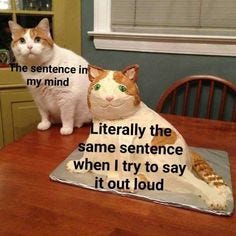Welcome, aspiring polyglot! There are some things people will pick up right away. Behaviors that are easy to adopt and methods that seamlessly integrate with most people’s routines. On the other hand, there are some things that many people will avoid even after being shown the benefits time and again. Writing within the context of language acquisition is probably the greatest example of this. No matter how many times I say that writing is worthwhile, there will be people who ignore the advice to do something easier.
Every single person I work with has heard me explain over and over again how beneficial writing is, but it often takes weeks or even months before they start writing themselves. They all tell me quickly after they begin how much they regret putting it off for so long. Aside from the fact that you will be able to remember more of what you have been working on, writing will come with the added benefit of giving you a written record to track all of your progress.
Playing to your strengths
At the end of the day, you will remember things better if you write them down. It is incredible how quickly you will feel the change too. Over the course of a week you will start to notice that all of the words you have been struggling to remember for weeks or months are suddenly sticking. The reason behind this is probably more simple than most people want to acknowledge. All that really matters is getting as many different senses interacting with the language as possible.
If you see a word and you hear a word and you say a word and you write that word down, you are far more likely to be able to recall it on command than if you only see the word. It works even better if you find ways to use these new words you learn immediately in your own use of your target language. You are going to have to use the words sooner or later, so might as well get started with it as soon as you can. Waiting will only further delay your progress.
Finally, getting your writing together early on will serve you in that it will act as a record of where you started and where you are going. The people I work with start this immediately and grow it for three to twelve months. While I usually allow translation aid, for this writing exercise, try to avoid using any translation help. If you are getting help it will skew your view of your starting position. You need to realize exactly where you started in order to appreciate where you end up.
Pick up your very own French Language Logbook or Spanish Language Logbook using those links so you can jump straight into writing without having to create your own templates or frameworks!
The simplest way to solidify your language skills
There are a few ways you can start writing and I recommend trying them all out to see what fits you best. Everyone is different so just because I enjoy writing out long stories and trying to make them as detailed as possible does not mean that will work for everyone. One of the things that will benefit anyone, however, is texting, if at all possible.
If you know people who speak your target language and those people would be happy to help you practice, all you really have to do is text back and forth. It is a good way to write, in a way, all while finding out exactly how native speakers talk to one another. You will find quickly that there are things you would have never expected because language evolves faster than textbooks are updated. Speaking with people this way will help you improve in multiple areas, so it is worth giving it a try.
On the other hand, if you don’t have anyone else to talk to you can try talking to yourself. What I mean by that is, you can start keeping a journal. No one will ever have to see it so mistakes shouldn’t hold you back. You are going to have to learn to think in your target language eventually, so the sooner you start the easier it will be. The advantage that keeping a journal has over texting is that you will always be able to go back and make corrections or edits to improve upon what you have written.
In this way you can write out all of the new skills you are learning and put them to use immediately rather than waiting until they fade into your memory. People often see something in class or hear something new when they are talking to people only to turn around a month later and learn the same thing all over again. The minute you begin putting something to use is the minute you will start ingraining it, making it easier to access in the future.
How to start today
Keeping in mind the necessity of using your new skills, you should start today and here is the #1 easiest way:
Start writing.
It sounds simple, but many people would argue that it is actually rather difficult because you have far too much freedom. So, here are ways to channel your efforts to ensure you are getting the maximum return:
Write 5 sentences every day for one week
no translation help, everything should be from memory even if it is incorrect
Use every skill you know. Verb tenses, grammar tricks, complex vocabulary
At the end of the week, go back and make corrections/alterations
Write 10 sentences every day for one week
no translation help, everything should be from memory even if it is incorrect
Use every skill you know. Verb tenses, grammar tricks, complex vocabulary
At the end of the week, go back and make corrections/alterations
Write 15 sentences every day for a week
no translation help, everything should be from memory even if it is incorrect
Use every skill you know. Verb tenses, grammar tricks, complex vocabulary
At the end of the week, go back and make corrections/alterations
If you need some more ideas for assignments and work you can do to ensure you are getting the most out of your studies, make sure to check out the Language Learning PDFs page for the “Homework and Assignments” document we created.
Language Learning PDFs
Welcome, aspiring polyglot! This page will host an archive of all the language learning PDFs created for paid subscribers. Come back and check often as only some of the new items will be announced in articles.
It is simple, but you will be challenged and over time you will see that your progress really accelerated when you started to take writing seriously. Ideally there is someone with whom you can share these sentences so, but if not you will need to use something like reverso.com to check your work and ensure you are approaching different challenges correctly. Writing is not the only time you should be practicing this skill of “thinking” in your target language, though.
Throughout your day you should be doing everything in your power to think of how you would approach day to day situations in your target language. If you go out to eat, think about how you might order if you were somewhere that necessitated the use of your target language. Anything that crosses your mind during the day should also inspire the questions, “how would this sound in my target language?”
You can either do this now or you can do it when you are trying to speak for the first time, because that is what will happen when you are trying to speak with native speakers anyway. It will be exhausting, because thinking in multiple languages is simply exhausting, but it will pay off in ways you cannot imagine. Eventually you will reach the point where you no longer have to do this actively, but in order to get to that point you need to start somewhere.
The last thing you need to start doing immediately is writing down new concepts or words that you see and hear. Every time you learn something new, take the time to write it down. Otherwise you may find that you are constantly looking up the same things over and over again which can quickly become demoralizing. Even if you don’t necessarily remember it the first time, it is far more likely to stick every time you do write it down and use it.
Conclusion
It is always funny to me how many people come back after weeks of not writing only to start and realize how much time they lost by putting it off. After about six weeks people usually start to realize that it is absolutely necessary in order to ensure any enduring progress. I am telling you this because it is always better to learn from other people’s mistakes when possible. This is one of those times and if you do not start writing now you will only become another warning to future language learners.
It is not a panacea, but writing will enhance and accelerate your language acquisition. Try not to go into it with too many expectations as your first attempt will likely disappoint you. Give yourself time and grace to get into the swing of things over time. Most people give up too early because it is not exactly enjoyable, especially as you are faced with your deficiencies. They are there whether you acknowledge them or not, though, so you might as well attack the problem head on.
Eager for more Second Language Strategies?
For more content find me on Twitter or Instagram. If you are struggling to get speaking in your target language, get up to 55% off a Babbel subscription using this link. I look forward to seeing everyone’s progress in the months and years to come. Be sure to check out the YouTube channel as well!
Learning Spanish? We have begun aggregating resources in you Spanish Resource Newsletter!
Don't forget to pick up your very own French Language Logbook or Spanish Language Logbook!









